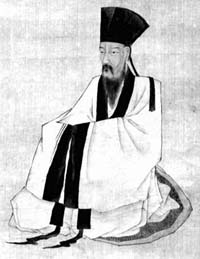I have this contention that there is in fact a naturalistic wisdom. That is we as human beings have an inherent wisdom that arises out of our embodied minds. It is rooted in a twin insight, the one aspect of it is that we are each of us unique within the world, but at the very same time made up of the stuff of the world. And that we have access to a body knowing which arises as a tension between knowing we are individual selves but that we are all of us intimately connected.
For me part of my own path has been looking at how this insight arises within differing peoples within differing cultures throughout our history. Personally, I find a deepest resonance with the expression of this insight within the analysis of Zen Buddhists, especially as it developed within Japan between the twelfth and nineteenth centuries and then washed through a bath of Western rationalism between the middle of the Twentieth century and down to today.
But, I am also pretty convinced we always see through a glass darkly. So, I’m fascinated when I see variations on this insight. And as it happens today is the anniversary of the General Wang Yangming and his army putting down the Prince of Ning Rebellion against the Ming Dynasty in 1519. The general raises some very interesting and difficult questions.
What I find intriguing, challenging, inviting is that he was at basically the same time a successful general, he was also an accomplished Neo-Confucian philosopher with interesting ideas about mind and the relationship of insight and engagement.
If I read it right according to the good folk at Wikipedia Wang Yangming had some views that mirror in substantial ways currents of my hypothetical natural wisdom. For one h held that mind and the world arise simultaneously. It seems he saw that our understanding of the world is shaped by the mind, which orders the information received through the senses. Along with that he believed that we have an innate intuition of what is good and what is evil. And taking all these things together he taught an integration of wisdom or insight and engagement, or rather that each arises because of the other and cannot be untangled.
And as frosting on the cake he taught a meditation discipline he “called ‘tranquil repose’ or ‘sitting still’ ( 靜坐 jingzuo).” A way, it seems, of turning the light within, the great foundation of the Zen ways. What that actually meant in his life, how seriously he engaged it, I have no idea.
All this noted, for me, at least within the moment, and based on some very superficial information, it does appear he offers another example of that naturalist wisdom. And, well, that he was a general, well, oh my opens other questions, as well. Which, actually is sort of the point of the quest for variations on the theme. Inviting and challenging all at once.
File under life is messy…













